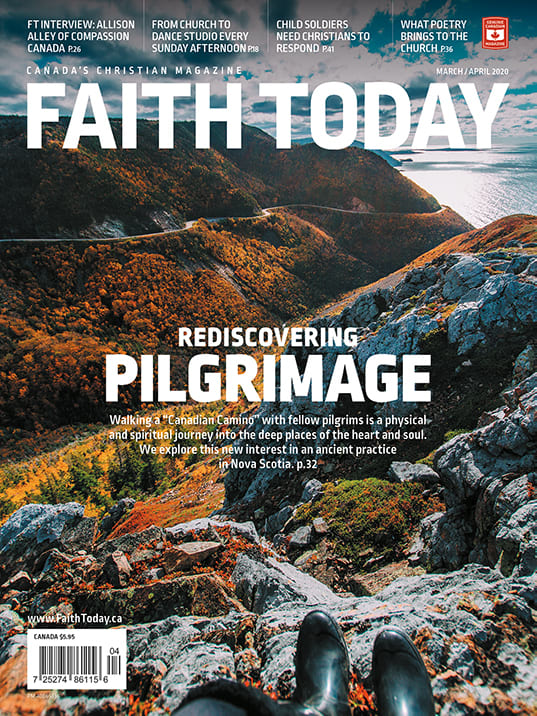This article was originally published in Compassion Canada’s Summer 2020 Magazine.
Karen Stiller of Ottawa and Bill Fledderus of Hamilton are both senior editors at Faith Today: Canada’s Christian Magazine, one of the country’s longest-running multi-denominational magazines. They recently spoke with Compassion Canada’s Managing Editor, Andrew Kooman, about the importance of religious journalism in Canada and how Faith Today connects and champions the Canadian church.
Compassion Canada: How long have you been with Faith Today and what drew you to the publication?
Karen Stiller: I’ve been working with Faith Today, to various degrees, for around 15 years. I knew of it before then though, and it was a publication I aspired to write for. I thought of it as the main source of Christian journalism in Canada, and one of the best faith-based publications. I still think that is true.
Bill Fledderus: Faith Today appealed to me since I first saw a copy in my university years because of its glossy, professional look and its reach across so many parts of the Canadian church I hadn’t yet encountered—more than 40 denominations. I started here in 1996, so I have to say new technologies have rewritten my job description many times.
CC: What’s your “elevator pitch” explanation of what Faith Today is all about to our readers who may not be familiar with your magazine yet?
KS: Sometimes I actually describe it as “Canada’s version of Christianity Today,” which can be helpful but is probably not an entirely accurate reflection of either publication. I describe it as news, features, interviews and inspiration for Canadian Christians trying to live faithfully in a changing and complicated Canada. I think our magazine draws a large country and a huge, sprawling Church together in a way that few other things can. I think it is reassuring, encouraging and challenging all at the same time.
BF: That’s right. I think the cross-denominational aspect is so important—the average Christian is involved in a congregation and often denomination, but our personal individual ministry could be so much stronger drawing on the wisdom and experience and different perspectives and insights of brothers and sisters in the faith that we might not otherwise hear about. I’d also like to say Faith Today is so much more than a printed magazine, it’s like a hyperlink to the wider Christian community. Some readers don’t go beyond the print, but there’s social media, blogs, podcasts, webinars and more for those who want to connect more deeply. We love to hear from readers in all kinds of ways, and we depend on their ideas and feedback.
CC: What kind of story really invigorates you as an editor?
KS: I really enjoy working on a story that tells about how “ordinary” Christians are living out their faith in their families, their work and their communities. Because, of course, ordinary usually ends up being so special, moving and extraordinary. A recent example would be a piece we did on grandparents and faith, and another very moving essay we had recently on ageing by the writer Maxine Hancock. We’ve done stories on how reconciliation is worked out in communities and lives across Canada, and those kinds of stories give me great hope and strength for my own walk and work.
BF: When someone is willing to make themselves vulnerable in a story, for the benefit of other Christians, that courage always inspires me. For our Jan/Feb 2020 issue I worked with an author who lives with ALS, a terminal illness, on an essay he wrote about praying for miraculous healing but not receiving it. We’ve also published journalism about sexual exploitation. Can you imagine being an ex-prostitute or a victim of sexual abuse by a church leader and speaking out to a journalist about your struggle for healing from those experiences or the ongoing wrongs and injustices that continue to harm new victims?
CC: What’s one of the most impactful news stories you’ve encountered in your journalistic career and how did it influence you?
KS: I visited South Sudan and Uganda to write about the refugee crisis resulting from the conflict in South Sudan. It was deeply moving to me to see life in refugee camps firsthand and try to understand a deeply complex crisis and how it impacts the lives of people just like me and my own family. Those stories stretched me as a writer and in the end, the most honouring way I could come up with to write about those situations was to share with readers my own questions and observations and be very transparent with how much I did not know for sure. I told the stories of a few people I met and interviewed and tried to tell them really well. It was humbling, challenging and a privilege that I will never forget.
BF: I keep seeing examples of Christian communities, whether that’s a congregation or a ministry organization or a denomination, struggling with painful divisions and challenges. What impacts me is when Christians are able to be kind and gracious and loving even with those they disagree with. Maybe the best example of that is among many Indigenous Christians—so many times instead of letting the bitterness and anger win out, instead of turning their backs on us, they have extended a hand of dialogue and friendship. That’s only possible through the work of the Holy Spirit.
CC: The digital landscape has dramatically changed the media world and while many publications have moved away from it, you remain in print. Why is it important for you to still reach audiences in print?
KS: Print is still very much alive and well. Some people do prefer to consume their media digitally, but many, many Canadians—including a younger generation of readers—like to hold a magazine or a book in their hands, put it down and pick it up again later to finish reading it. Print and digital are both important and are still needed.
BF: There are different kinds of print. News journalism has switched to digital for most people, and I don’t see that going back because news is all about speed. But an attractively designed, printed magazine that offers insightful analysis, that helps you make sense of your world, a magazine that offers specialized news for a niche audience of Canadian Christians, that is a relief to relax with for many people. Faith Today’s print magazines are part of an entire communication package that includes, as I said earlier, blogs and podcasts and social media and all that. People’s attention are pulled in all kinds of directions, so offering them a variety of delivery options to take in our important messages seems to be what’s needed for successful communication in our world today.

CC: Faith Today is also active in the digital space. How have you seen technology open doors for conversations about faith in Canada?
KS: I think right away about our podcast, we call it The EFC Podcast, named after Faith Today’s publisher, The Evangelical Fellowship of Canada. We cover a lot of Faith Today-related material in the podcast, which I usually host. The podcast technology allows us to present another layer of story, another venue for interviews and conversations that we think are important and hopefully both challenges and encourages the Church in Canada. And of course, there is the obvious and simple answer that technology and social media spaces allow us to easily share stories and information with readers and give them that same freedom.
BF: The trick with digital is that most of us customize our channels to receive only what we want to hear, stuff that we agree with. And so we only hear limited amounts about strangers. The diversity within Faith Today helps many of our readers widen their knowledge, at least to the extent that people who might otherwise be strangers within the Body of Christ can be seen and heard, so we develop a stronger sense that even this other person from some radically different theological tradition or from the other side of the country is in truth a brother or a sister in Christ. Faith Today also goes farther in the sense that we offer Christian analysis and opinion about the broader Canadian landscape, social issues for example that go beyond the Church to affect Canadians of all faiths. Our publisher, the EFC, is involved in a variety of multifaith initiatives, for example in defending religious freedom for not just Christians but people of all faiths, and we report on that. I’d also say it’s really great when our staff interact with the wider world of mainstream journalism, we have some good discussions breaking down stereotypes that some non-Christians hold about Christians.
CC: Your website highlights that religious journalism is “an essential piece of religious freedom in Canada.” Why is this so?
KS: In Faith Today we have a feature or department called Church in Community. In every issue we highlight a simple, effective way a Canadian church (of all sizes, denominations and locations) act out compassion, love and service in their community. Those kinds of stories encourage other Christians to do the same kind of thing, to think creatively about how their church exists and loves their neighbourhoods. The value churches bring to their communities—their public good—is part of the story we need to tell to help preserve the ‘place’ churches hold in communities. We remind people that churches matter, and faith can make a positive difference in the life of our country. That’s one example. Religious journalism helps do that. It reminds people that the Church is actually alive and well, and a force of good and love and compassion (at least when the Church is at its best). Religious journalism also brings much-needed nuance to stories about issues like medical assistance in dying, laws around prostitution, poverty, homelessness, international development issues and much more. Faith-based journalism tells stories that others don’t, in a way that others can’t, and we believe that plays a role in protecting religious freedom in our country.
BF: I’ll just say amen to that.
CC: In a recent issue, your cover article highlighted a post-Christian Canada, noting that half of all Canadians now identify as either agnostic, atheist or unreligious with only a tenth attending religious services each week. How do you grapple with such statistics and where do you identify key areas of opportunity for Canadian Christians to make an impact in our culture?
KS: I think we grapple with statistics like that, first of all, like anyone else. We were surprised, but not shocked, disappointed but not dismayed. We have the opportunity with our magazine to dig into stories like that, to solicit a variety of opinion and thinking around it, including some solutions or positive responses to that new reality in Canada. We have the opportunity with every issue to present hopeful stories of churches and individuals who are doing really creative, loving things in this new context. Those stories give others hope and energy and really good ideas.
BF: There are a ton of really wise and experienced ministry experts in Canada, both practitioners and thinkers, but the average Canadian doesn’t have access to them or sometimes doesn’t even know who they are. That’s where Faith Today plays an absolutely vital role for Canadian believers, enabling those wise voices to be heard and understood.
CC: What are some of the things that God is doing in Canada that you’re most excited about?
KS: For me, it’s a focus on the neighbourhood. I’m encouraged by the many, many churches who are loving their communities so well, and looking for ways to partner together or with other like-hearted organizations or groups to make a difference in the lives of people. The Church is doing what the Church should be doing in so many cases, and I find that deeply hopeful.
BF: God is enabling partnerships and cooperation across all kinds of church sectors for the advancement of His Kingdom. Sometimes it takes a disastrous situation to force us to cooperate for survival, other times we have visionary leaders working proactively to multiply the influence of the Body of Christ, but whatever the cause, it’s exciting to be part of it.
CC: What content are you currently reading, watching or listening to right now that is influencing your thinking or inspiring you?
KS: I’m going to answer this question from the personal level, which means a lot of reading about the intersections between creativity, writing and faith. I’m really interested in the role story plays in our lives and in the Church, and by story, I mean telling our true stories about ourselves and our struggles and victories in a very transparent, but also an excellent way. I’ve been reading a lot of memoirs—both old and new—that is powerful because people are willing to tell the truth about themselves, their need for grace and God, and how God meets them in that, all the time, without fail. That is what is inspiring and challenging me these days.
BF: I recently joined a book club at my church, and they’ve had us reading novels that deal with racism and terminal illness and other serious stuff. It’s so good to be able to talk about challenging topics with other believers, seeking to discern together. I read a lot about journalism, which is my work of course but also a subject I teach part-time at Redeemer University. On my own I like to read (and watch) historical fiction and science fiction, which challenge me to see the world in fresh ways, often at the big-picture level. And lastly I actually read poetry, maybe also to help see the world from other points of view.





